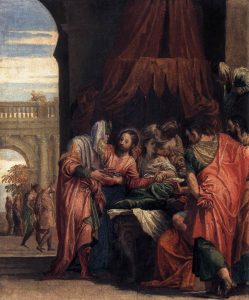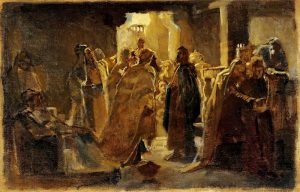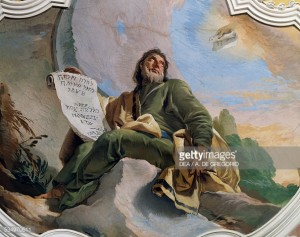Thoughts on Sunday’s Lessons for June 30, 2024

The Raising of Jairus’ daughter (c.1546), oil painting on canvas by Paolo Veronese (1528-1588). The Louvre, Paris. (Click image to enlarge.)
First Reading (Track One): 2 Samuel 1:1, 17-27
Our journey through the story of Israel’s kings moves into the second book of Samuel. After a series of conflicts between Saul and David, King Saul has died, the battle against the Amalekites has been won, and David is king in his own right. Despite his troubled relationship with Saul, in this Track One first reading we hear David mourning Saul’s death. But that sorrow is eclipsed by David’s deep grief over the loss of Jonathan, Saul’s oldest son and David’s beloved friend. The reading concludes with a long, loving ballad that David calls the Song of the Bow, in which he declares Jonathan’s love for him “wonderful, passing the love of women.”
First Reading (Track Two): Wisdom of Solomon 1:13-15; 2:23-24
Love is so strong that it has power even over death: Our loving God desires neither death nor destruction for us. We hear these hopeful ideas in Sunday’s Track Two first reading, and they recur through the day’s Lectionary selections. First we read the Wisdom of Solomon (often simply called “Wisdom”) from the apocrypha, the 15 “extra” books included at the end of the Hebrew Bible. These verses – which follow just after a warning to an earthly ruler not to invite his own death or destruction by behaving badly – remind us that God’s creation celebrates our life, not our death. God’s creation is a thing of beauty, and righteousness lives forever.
Psalm (Track One): Psalm 130
Titled “De Profundis” (“out of the depths”), this Psalm of faith in God’s redemption reminds us that we wait in hope for God’s love and grace even in times of grief, pain and despair. Even in death we await the resurrection, as in night’s darkest hours we wait for morning light. We hear this psalm three times in this Lectionary cycle; it is also suggested for use in the burial of the dead.
Psalm (Track Two): Lamentations 3:21-33
This short, song-like passage is taken not from the Psalms but from Lamentations, a short book traditionally attributed to Jeremiah. These brief verses echo the hope and trust in God’s love that we heard in the Wisdom reading. In these words we sing our hope in God’s steadfast love that never ends, love that is renewed every morning. In words that foreshadow the Sermon on the Mount, we sing of giving our cheek to the one who smites us while we wait for our loving God who will not willingly afflict us.
Alternate Psalm (Track Two): Psalm 30
According to tradition, this ancient hymn offers thanksgiving for recovery from a serious illness. There is faithful optimism in these verses as the Psalmist celebrates the gifts of God that bring joy: an end to the sadness and depression that so often accompanies illness; turning the weeping of those long dark hours of night into the celebration that comes at dawn; and turning the mourning of sickness into the dancing of health.
Second Reading: 2 Corinthians 8:7-15
To understand Paul, it is often helpful to recognize him as a pastor who loved the people of this little church, but who often found them cranky and difficult to persuade. Knowing that the congregation in Corinth included both hungry poor people and comfortable rich members who sometimes didn’t want to share, he urges them all to live by the generous example of the churches in Macedonia (mentioned in the verses just before this reading): Do your work, earn what you deserve, but give according to your means so all may have enough.
Gospel: Mark 5:21-43
Jesus and the apostles have come back home from their trip across the Sea of Galilee. Now Jesus performs two surprising healings, encountering one on his way to attend to another. The woman with the hemorrhage that has been with her for 12 years was ritually unclean because of that. She was poor and rejected by her neighbors. But she had great faith in Jesus. The 12-year-old child was the daughter of Jairus, a leader of the synagogue, an important person. When Jesus told the crowd around her bed that he could waken their seemingly dead child, they laughed at him. But Jesus did not care about approval. Calmly, without any fuss, he healed both the woman and the child.


